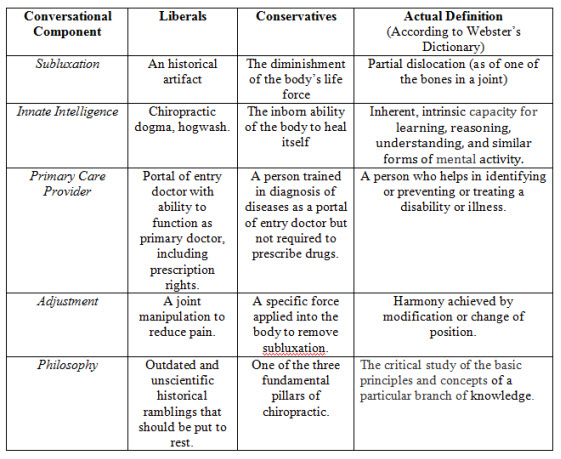
“She needs some good spinal manipulations today.” Shortly after making this statement, three doctors and two interns descended defensively on our front desk assistant and insurance guru. “We adjust, we don’t manipulate anything.” The words came out of all five mouths in rapid fire and she withdrew slightly into the back of her desk. Timidly, she asked, “What do you mean? I bill insurance for spinal manipulations everyday. Why does it matter what you call it?”
This incident reminded me of countless nasty words I’ve read on Facebook passed between two chiropractors, accusing each other of being nothing short of complete idiots for how they practice or speak about what they do. The real issue lies within our communication, and the conversational domain that makes up our professional language. The idea of a “conversational domain” as I’m using it here came from a weekend course I took recently that was completely unrelated to chiropractic.
In this course, a new program Landmark Education just launched as part of their reinvention process, we discussed the idea of a conversational domain, a set of words defined and understood by a group of people to make them experts in their field. In the case of the course I was in, it had a completely new and distinct conversational domain from all other Landmark Education programs. Like the course, medicine has a conversational domain, law has a conversational domain, and like all other professions and specialties chiropractic has a conversational domain.
What makes a profession a profession is a unified understanding of specific words that define the profession and what the profession does. If we look at the chiropractic conversational domain, is it really any wonder we continue to have the internal conflict we do? We have two different factions fighting with each other in two different languages!
Here are a few examples of some of the words that make up the conversational domain of chiropractic. For simplicity, I used the classification provided to the two sides of our profession at the USDOE hearing in December 2011: the liberals (wish to take chiropractic into the western medical world), and the conservatives (wish to keep chiropractic pure). The definitions I have created have come from things I have seen, heard or read in the last few months. In addition, I’ve included the definitions of each term as defined by Webster’s Dictionary:

The definitions from the dictionary are also less than ideal, as there are, what many feel are key concepts to chiropractic that are left out of some of the definitions above (for example, the chiropractic definition of subluxation includes nine elements to classify or diagnose a subluxation, and has disastrous effects on the nervous system). In other words, the words we use to define chiropractic and what it is we do, fail to describe exactly what it is we do without a lot of explanation, and unfortunately a lot of interpretation. Our own language yields a lot of confusion and misunderstanding by both chiropractors and consumers.
I believe that as we stand on the brink of potentially massive change within the profession, one of two things will happen: either the two warring professions will finally go their separate ways, and one will maintain the title Chiropractic, while the other becomes something else, or a miracle will happen and we’ll find a common language through which to communicate as the professionals we are.
The thing I found most inspiring about the USDOE hearing, which I attended in December, was that none of those who testified against the CCE did so in a way that showed blatant disregard, disrespect or hatred. In fact, everyone spoke candidly of their concerns about the CCE as a professional speaking of other professionals.
The use of language and name calling seen recently on social media sites and that occurs out in the real world does nothing to help do what chiropractic is really intended for, that is, be available for consumers. The entire world needs to be adjusted, and we hold ourselves back by internal quibbling that boils down to opinions and misunderstandings of the words that make up our professional conversational domain. I wonder what would happen if we all took a moment to consider the language we use, the definitions of those words (not what we think they mean), and took responsibility for the words coming out of our mouths (or fingers)? Perhaps it would actually be possible to enter into a professional conversation around our differences, rather than a lot of name calling and finger pointing which essentially gets us nowhere.